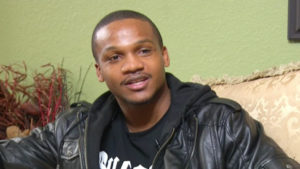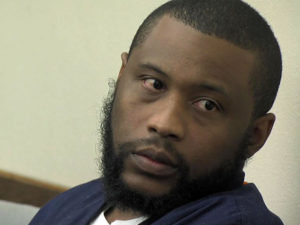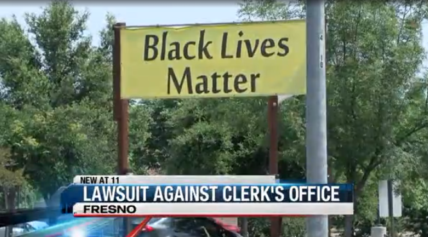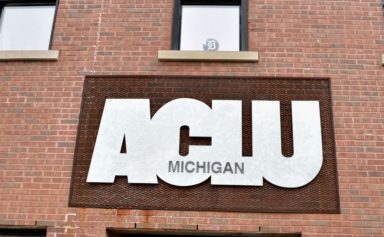[UPDATE: On Monday, a San Diego Superior Court judge dismissed the charges against rapper Brandon Duncan, also known as “Tiny Doo,” and Aaron Harvey, concluding there was not enough evidence to bring them to trial on conspiracy charges.]
When San Diego prosecutors step into a California courtroom today, in the eyes of many they will be putting aspects of Black culture on trial in the prosecution of Aaron Harvey and Brandon Duncan.
It is a case that has enormous implication for the Black community and young Black males. The prosecution is charging these two Black men with gang conspiracy related to murder because one of the men has a suggestive tattoo and flashes what prosecutors believe are gang signs in his Facebook photos and because the other has incriminating lyrics in his rap songs.
Though prosecutors acknowledge that the men had nothing to do with the string of gang-related murders the prosecution is pursuing, they allege that the men benefitted from the crimes because their stature was increased.
The men will appear today in a San Diego court to ask a county judge to dismiss the case because the charges are without merit. If the case isn’t dismissed, Harvey and Duncan will be among 15 people facing possible life sentences for allegedly benefitting from nine murders prosecutors say were committed by members of the Lincoln Park Bloods in 2013.
Neither man has a criminal record.
The case has major implications because the criminal justice system is trying to establish that if it can make even the remotest link to criminal activity, reaching for common emblems of young Black male life, that could be enough to send someone to jail for a long time. The ACLU says race clearly plays a factor in the prosecution pursuing the two men.
The charges against the two men are based on a law, section 182.5 of the penal code, passed by voters in a 2000 referendum that was intended to allow authorities to go after gang members by stating that any suspect “who willfully promotes, furthers, assists, or benefits from any felonious criminal conduct by members of that gang is guilty of conspiracy to commit that felony.”
Harvey said he is not a gang member and is guilty only of growing up in Lincoln Park, a neighborhood where gangs are a significant presence.
“They told me I was wanted for murder,” Harvey told local San Diego NBC affiliate KNSD of his arrest in Las Vegas last year. “I’m walking out of my house one day and it’s like the U.S. Army is outside waiting on me with guns drawn, helicopters, and assault rifles.”
Prosecutors contend that Harvey flashes Bloods gang signs in Facebook posts and has the letters “CK” tattooed on his triceps, which prosecutors say stands for “Crip Killer.” In addition they claim there were references on social media to his alleged gang moniker, “Baby Struck,” by suspected gang members.
“He is as liable as the shooters were even though he didn’t know they are out doing this,” Edward Kinsey, Harvey’s attorney, told the local TV station. “What we’ve got here in the case of Aaron is guilt by association.”
As for Duncan, also known as Tiny Doo, prosecutors claim he brags about committing the 2013 crimes in his lyrics. His lawyer Brian Watkins told the Los Angeles Times that his client’s lyrics are harmless, saying it is the same kind of expression used by revered greats of West Coast rap.
“It’s no different than Snoop Dogg or Tupac,” Watkins told the paper. “It’s telling the story of street life.”
Duncan, who spent months behind bars after his arrest, said in an interview with 10News that his album “No Safety” is merely about urban culture and does not promote gang violence.
“I’m just painting a picture of a story, that’s it,” Duncan said. “I’m not telling anybody ‘hey go commit this crime.'”
“The district attorney is basically prosecuting them for the content of their speech,” David Loy, legal director at the Southern California chapter of the American Civil Liberties Union, told Al Jazeera America, saying these kinds of charges violate Duncan and Harvey’s right to free speech under the First Amendment.
Loy said he also believes race plays a factor in the prosecution.
“I think it is part of over-prosecution and over-criminalizing people of color,” he said. “I think they should only be prosecuting people they have good cases against, but they’ve definitely gone way too far in this case.”
Loy added that prosecutors are “experimenting on this group of people, pushing the envelope as far as they think they can.”
But the San Diego County prosecutor’s office has not backed down.
“We believe if you join a group whose primary purpose is to shoot people in the adjacent neighborhood, and promote and/or benefit from the shooting of the people in the adjacent neighborhood, that the members are responsible even if we can’t show they all knew exactly when and who in that neighborhood would get shot,” the office told Al Jazeera.
In a press release, the prosecutor’s office said it was just using new tools available to prosecutors through the Internet.
“In the past, the use of the 182.5 statute was difficult because evidence had to come in the form of police officers telling a jury what they saw on the street as being gang promotion and membership, etc.,” the office said in a release. “However, in the age of the Internet, investigators can collect thousands of social media pages and links of these defendants promoting the gang and demonstrating in no uncertain terms their gang membership. Prosecutors across the country routinely use this type of evidence to prove active gang membership.”
Loy, who wrote a friend-of-the-court brief for Duncan, questioned how a person can “benefit” from a crime without ever knowing about it or approving it.
“They’re saying I benefited from these crimes and they are saying my benefit is my stature went up,” Harvey told NBC. “I don’t know how you can even measure stature or how can a person’s stature goes up. I didn’t even know I had stature.”



